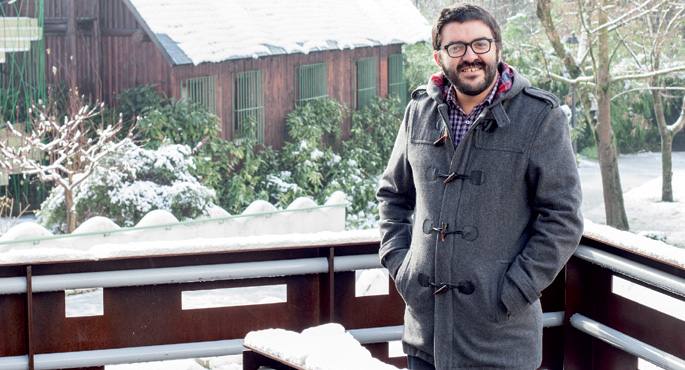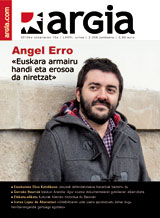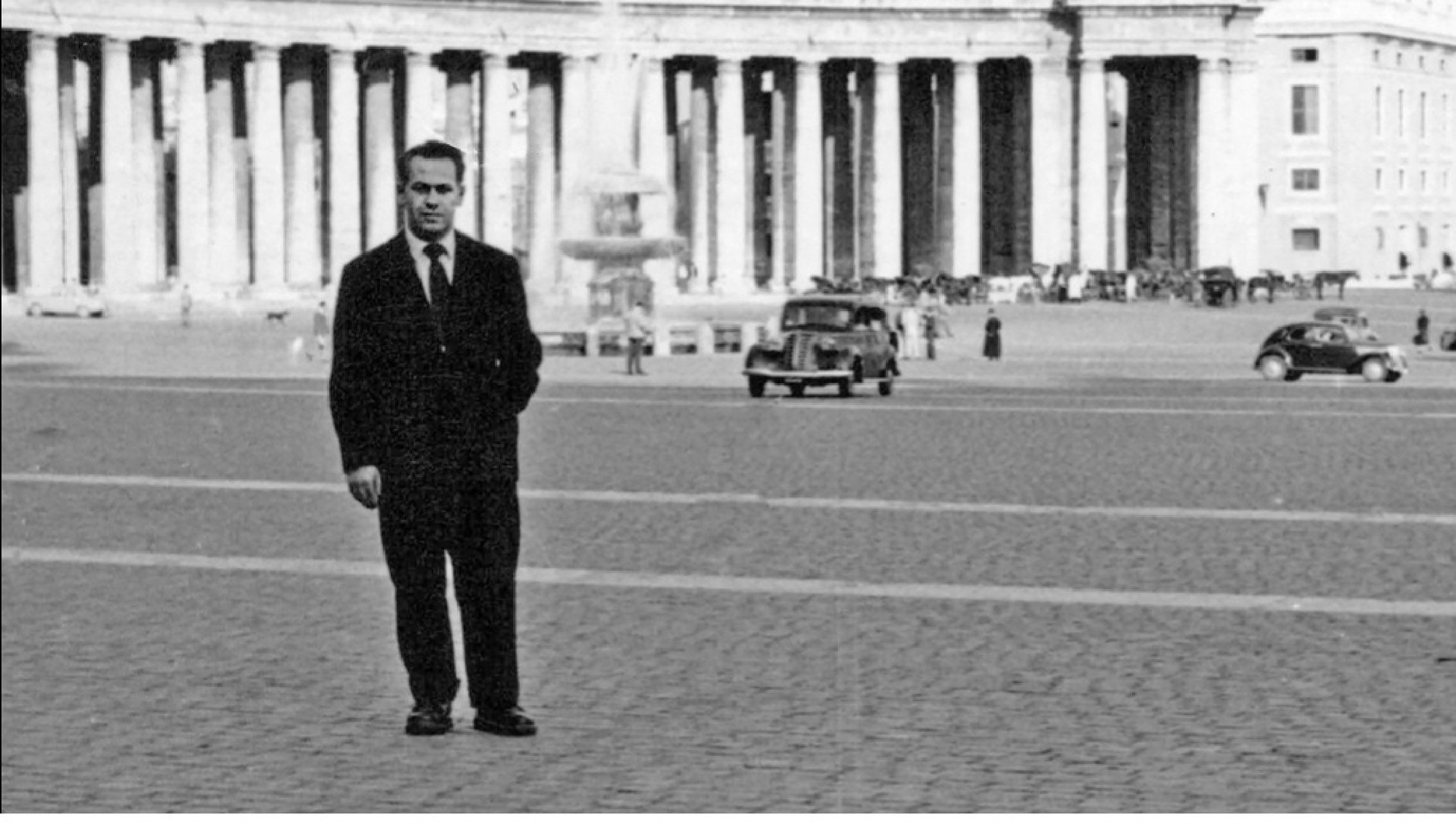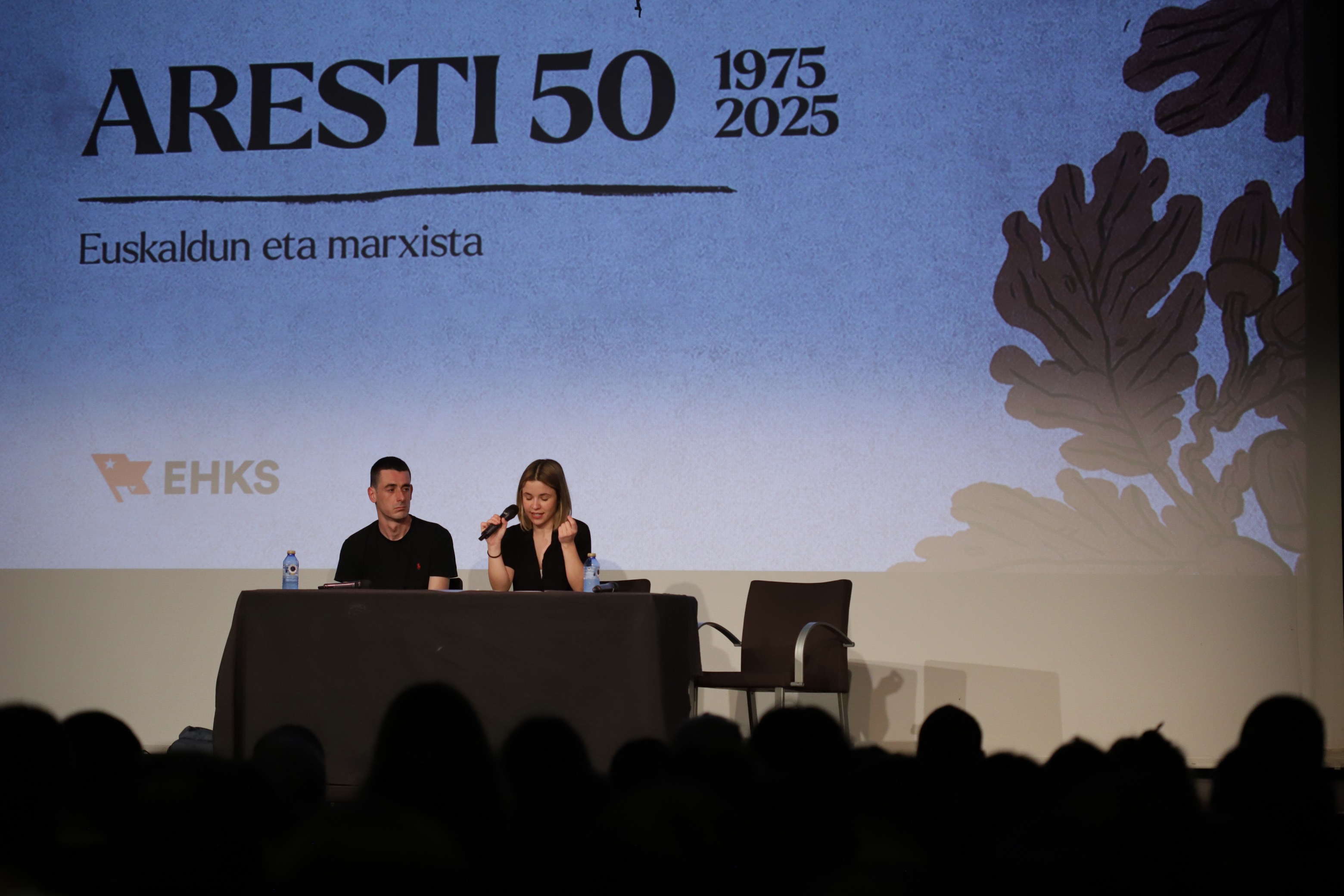"Humor, like salt, is a good preservative."
- Ángel Erro: zombie poet and batelero del Volga.

34 years, 35 in May.
And I don't have an e-book yet. I say that if someone is thinking about what to give for my birthday … I think nobody gives me because everyone thinks I have it for a long time. That is why I take this opportunity to ask for it in the talks and in all public places.
Do you want one of them?
Yes. On the other hand, I would need two days to read all the paper books around me. I wouldn't care, though, if I had to ask for more lives for it.
Isn't it strange or uncomfortable to read on this electronic medium?
Paper books have a geography that we know and, in that sense, we can walk comfortably. It's a known path, and we can move forward and backtrack because we're used to it. However, we must not be afraid of the new spaces. Umberto Eco was recently asked about this, because in an earlier interview he had already said that the Internet and e-books were going to lead to a decline in culture. (They asked him about the same thing, because normally the interviewers want the interviewee to repeat what has already been said in the previous interviews) And then Umberto Eco had to rectify saying that it's actually not for that much, and so on. Maybe someone would give you an e-book, not like me. Care must be taken when we talk about the decline of culture.
And write? On the computer or hand?
Usually by computer, because it is very comfortable to make corrections, etc. Anyway, those of us who didn't have tablets and electronic slate in school have the habit of writing by hand. Furthermore, as for old age, I forget the ideas so as not to point them to the moment, although then I see what I have written and understand what I have written in a much better percentage than I have forgotten those ideas. It can be a poetic Darwinism.
Study Law, but without vocation. Why?
For practical reasons. Especially for comfort, which is usually the worst option. But also the most chosen. I wanted something that could be studied in Pamplona, I didn't want to go to the university of Opus, and at the UPNA it was the thing that dragged the letters the most. In addition, at home they wanted a practical thing. I don't regret it. It would serve for something. To confirm my seriousness, for example, to remain a serious man. I also told myself that many writers had studied law, for example, Igor Estankona. I saw it clear instantly, and as soon as I finished I turned to literature.
He studied Basque Philology in Vitoria and began preparing his doctoral thesis. Do you intend to end?
Not in this life or, in any case, at the time of retirement.
In 2002 in Harkadia I and in 2005 in Body Humors.
No more books, for the moment. I'm aware that I've been missing a book for a long time. And I miss it because people ask me and journalists as well. It's not nice to do interviews, but it also has its morb. I think this conversation takes my ankle off for about eight more years and, as a result, the publication of the next book will be delayed. And even more, if I realize that you don't need to do anything to be interviewed, maybe I don't have to draw any books all my life.
But is it necessary to publish a book today to be a writer?
Less and less. For example, today I believe that a hidden struggle has been established between the Basque poets to see who leaves the greatest distance between one book and the next. Jon Benito published his latest work after nine years of silence or Rikardo Arrangi Diaz de Heredia published it after fourteen years of silence. Perhaps this is a form of discouragement for poets: if it is a value to take the books out as late as possible, they can enter the path of disappearance. Well, this is silly.
There is no new book, but there are media and social networks in which you do not stop working.
Nobody knows what will remain of this memorable time for the future. It may be that, always in the field of literature, what futures value is an area that we do not now consciously address. Probably in the seventeenth century writers would work thinking that this was what they were worth and that it would be what would take them to the Basque paradise, leaving in the background works of fiction and that they were left out of the canons. And they were making a lot of mistakes. It's my little comfort. Maybe Twitter entries are the only thing that's going to be picked up in the books that will remain in the 21st century. Or TV ads like Shakespeare's are praised. There is no need to underestimate anything and that is why I pay close attention to the articles I write for the Light and other means.
You're a great linguist: English, French, German… and Latin, also a little Greek, of course.
Yes, but all at a discreet level. Anyone who does not believe me would be invited to go with me to Sanfermin to check it, since that week there are an au-pair event in Pamplona and people here do not have to go anywhere with an Erasmus scholarship to practice languages. Words are nice in all languages. If you like words, the more languages you know, the more background you see. It ceases to be a superficial relationship and becomes a passionate lover.
In his two books and many articles, he recovers and brings the classics closer to current readers. Is this one of your main contributions?
My "Trapem diem." A friend calls me the classic. It's true, but I don't know if it is, or because the first public appearance is like this, because I put that stereotype and then I kept feeding the topic without realizing it.
In this systematic exclusion of classics, can one think that something also fails in teaching?
Maybe a bad selection is made. I don't know, I don't remember what we were given to us, but I can get the impression that it may be because in other areas they fail the same thing, that the choice that young people are given is to be consumed by adults or, on the contrary, very fossilized and infantilized.
What are you interested in about these authors?
There's some kind of prevention or fear of classics, or maybe just bad fame, but at least they have one side: time. A sieve that isn't made in today's stuff, it's made with its work. It has gone through the hands of many people and has forgotten all that needs to be forgotten, so not counting those people can be a pride. Classics can serve, among other things, to destroy some topics, such as thinking that we are the best or coolen. We run the risk of losing ourselves with that crazy tendency to follow the latest trend.
Is humor one of your main ingredients?
To compensate the other, in a way, if not, I would have to change the century or enter as a cure and I have no intention. But you have to be careful about humor. You can't say of yourself, "I'm ironic," or "I try to put humor into my work," because people can look at your writings and find nothing funny. I have already committed that sin. In my second book, Humors of the body, I said I was referring to humor. However, many people thought it was more serious than the previous book. You can make humor involuntarily or deliberately. In any case, if history has taught us that humor, like salt, is a good preservative, one way or another. I would say that in almost all literary works there is a great deal of humor.
You make a great production: Argia, Nafarroako Hitza, Iruñerriko Euskalerria irratia in three different programs, social networks…
My impression is that I do nothing. Except for the unspeakable things, it takes me most of the time of the day. To leave everything for later is a very Basque trend, as the great Axular made clear to us, which probably had it projected from the youth, but which he wrote the year before his death.
There have been terrible enfants in this Volga batter gang.
The quadrillate in the legal language is abhorrent. I've had a great time. I've learned a lot and I've made great friends. We were convinced that the Basque culture needed an outbreak and we wanted to bring out serious things in an exciting way. He was born in the golden age of blogs; now I think that's happened in part.
In Euskalerria Irratia together with Iñigo Astiz and Hedoi Etxarte you have created the group of zombie poets.
Maybe a generation of poets can come out of here. You can also have results: With Iñigo Astiz, and this is kind of exclusive, I'm making a book of poems written in four hands. Maybe my poetic return. The issue is not too serious, the provocative poems around the Basque culture. Even if nothing comes out, at least we will have a good time.
Being a Basque poet, you won’t be well known to most of your compatriots. Have you never thought about writing in Spanish?
I am the first to regret that the Basque and the Basque people want to make us invisible in Navarre, but, despite that, I find it very comfortable that it can be diluted among the people. It seems to me that many people regard us as speakers of Eastern Europe and sometimes I have felt it or fantasized about it. There's no more to see how some look at you and hold onto the bag. I feel comfortable knowing that I will not be asked for a Spanish column. The Basque is a large and comfortable closet for me. I'm sure my father is going to see this interview and ask me what I'm talking about. This paragraph about which I speak about my father will not be understood by him and that reassures me. Sarrionandia said that in front of the jailers the Basque was the only free space, and I too often have that feeling.
Angel Erro duela 34 urte (1978ko maiatzaren 12an) sortu zen Burlatan. Zuzenbidean eta Euskal Filologian lizentziaduna, hizkuntza, literatura eta musika klasikoaren maitale sutsua da. Euskaldunberria. Bi poesia libururen egilea: Eta harkadian ni eta Gorputzeko humoreak. Desira desordenatuak liburuaren 14 egileetako bat eta haren harira sortu zen Ez dok armairu ikuskizuneko partaide izandakoa. Volgako batelariak eta 31 eskutik blogetan, Argia aldizkarian, Nafarroako Hitzan eta Iruñerriko Euskalerria Irratiko hiru saiotan zabaltzen ditu bere artikulu eta gogoetak.
“Angel Erro ezizena aukeratu nuen, alde batetik, nire aleman zaletasunak eta, bestetik, lotura bitxiekiko atxikimenduak bultzatuta. Izen autoerreferentziala da. Bere burua adierazten du nolabait. Euskara-alemana hiztegian “Angel” hitza bilatzen baduzu, euskarazko bere ordaina “Erro” da. Eta alderantziz. Die Angel alemanez atearen erroak adierazteko erabiltzen da. Bitxia iruditu zitzaidan eta izen artistikotzat-edo hartu nuen. Batzuetan nire benetako izena ahaztu eta guzti egiten dut eta Harkaitz Herrero izenaz norbaitek deitzen didanean, ezin dut harridura sentsazio txiki bat saihestu. Edonola, batek ez du inoiz bere burua erabat ezagutzen. Dena da geure buruari kontatzen diogun kontakizun bat, entzun nahi duguna. Esaterako, aurrekoan lagun batek iradoki zidan nire bi poema liburuen izenburuetan (Eta harkadian ni eta Gorputzeko humoreak) agertzen diren “soberazko” H bitxi horiek nire benetako izenaren agertze fantasmala direla. Nik ez nion inoiz horri erreparatu; izan ere, ez dut uste hala denik, eta biribilki ukatu nuen, beti pentsatu izan dudana eta poemategien izenaz galdetu didatenean erantzun ohi dudana berrituz, hau da, hitz jokoak direla, lehen kasuan Antzinateko Arkadia idilikoa, berde eta oparoa, errealitatearen zakartasunarekin konparatu nahi nuela, harkadiak euskaraz harritza esan nahi baitu, harkaitzez betetako tokia; bigarren kasuan ere (h)umore hitzaren bisemiarekin jolasa egiten nuen, gorputzeko isurkari klasikoei tinta eta hazia gehituz, umore beltzez, hau da, malenkoniaz. Orain ez dakit hirugarren liburu batean H hizkia sartzera ausartuko naizen (ez dut uste), ezta, sartu nahi izatekotan, hitz jokorik geldituko ote zaidan erabili gabea”.
Zirikatzailea, trufaria, azkarra eta dibertigarria. Kultura handikoa eta memoria on samarrekoa. Zitak, izenak eta datuak purrustadaka iristen zaizkio burura, eta handik mingainera esaldi luze eta konplexuetan txertatuta. Ideiak ideiekin kateatuz infinitoraino. Elkarrizketan zehar, behin baino gehiagotan galdu garela, galdu dugula haria daitort. Baina ez du axola. Angelek lasaia, atsegina eta ia baltsamikoa ere badakiela izaten esanen nuke nik. Norgehiagoka intelektual batean adiskide bezala nahiago nuke mila bider, arerio baino.
“Aspaldian vinilo tempore esaten zidaten ‘zu bezalako gazte bat klasikoekin eta halako gauzetan zaletuta, zeinen bitxia’. Ez da hain harrigarria baina hori esaten bazidaten agian izango zen hutsune bat dagoelako, merkatuko horma-hobi bat edo”.
“Ongi pasatzea eta ongi pasaraztea. Orain ez dakit oso Ana Rosa Quintana aldera ez ote naizen lerratuko hau esatean, baina nik uste dut zoriontsu izateko gaudela munduan. Plazan zaudela, jendaurrean atsegina izaten saiatzea betebehar bat dela iruditzen zait”.
Angel Erroren txio bat Twiterren: “Euskararen zonifikazioa (vintage hori) Zesarren eran baino ezin da. ‘Navarra in tres linguisticas zonas divisa est’ http://la.wikipedia.org/wiki/Navarra#Linguae”.
Now that everyone has become more Franciscan than the Pope, it’s worth remembering our unsurpassed classics. There was one in the 17th century, his grace was Arnaut Oienart. And since we can’t immerse ourselves in all his works, today we will praise O.ten youth in... [+]
Aurreko tertuliako galderari erantzuteko beste modu bat izan zitekeen, akaso modu inplizituago batean, bigarren solasaldi honetako izenburua. Figura literarioaz gaindi, pertsonaia zalantzan jartzeko, edo, kontrara, pertsonaiaren testuingurua ulertzeko saiakera bat. Santi... [+]
Astelehen honetan hasita, astebetez, Jon Miranderen obra izango dute aztergai: besteren artean, Mirande nor zen argitzeaz eta errepasatzeaz gain, bere figurarekin zer egin hausnartuko dute, polemikoak baitira bere hainbat adierazpen eta testu.
Martxoaren 17an hasi eta hila bukatu bitartean, Literatura Plazara jaialdia egingo da Oiartzunen. Hirugarren urtez antolatu du egitasmoa 1545 argitaletxeak, bigarrenez bi asteko formatuan. "Literaturak plaza hartzea nahi dugu, partekatzen dugun zaletasuna ageri-agerian... [+]
1984an ‘Bizitza Nola Badoan’ lehen poema liburua (Maiatz) argitaratu zuenetik hainbat poema-liburu, narrazio eta eleberri argitaratu ditu Itxaro Borda idazleak. 2024an argitaratu zuen azken lana, ‘Itzalen tektonika’ (SUSA), eta egunero zutabea idazten du... [+]























